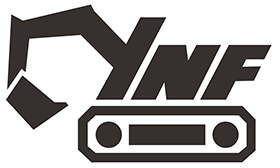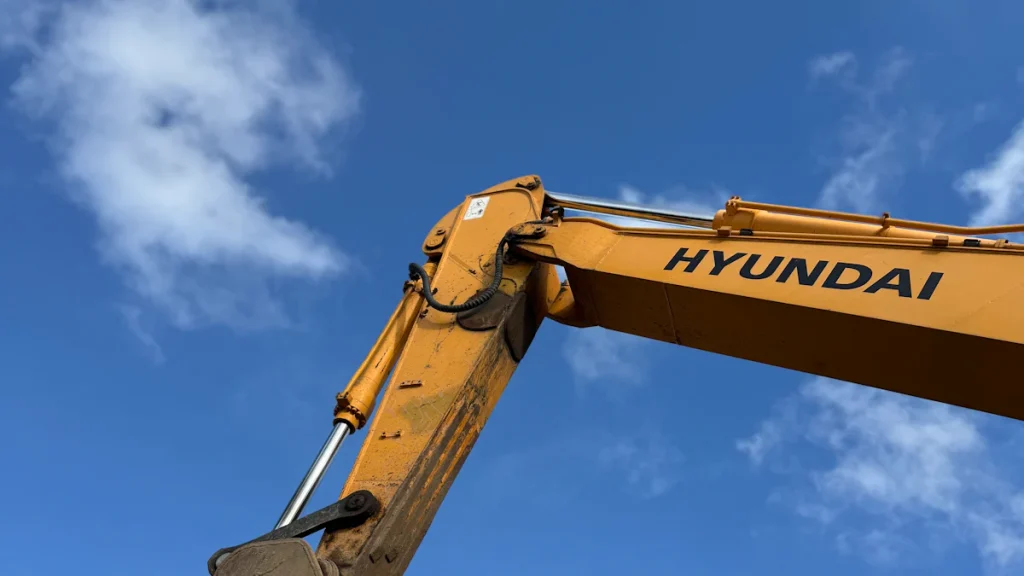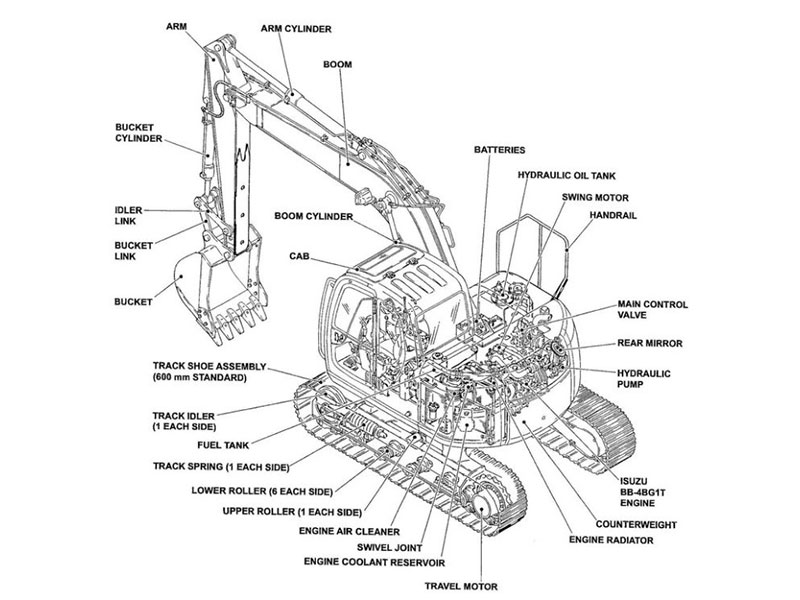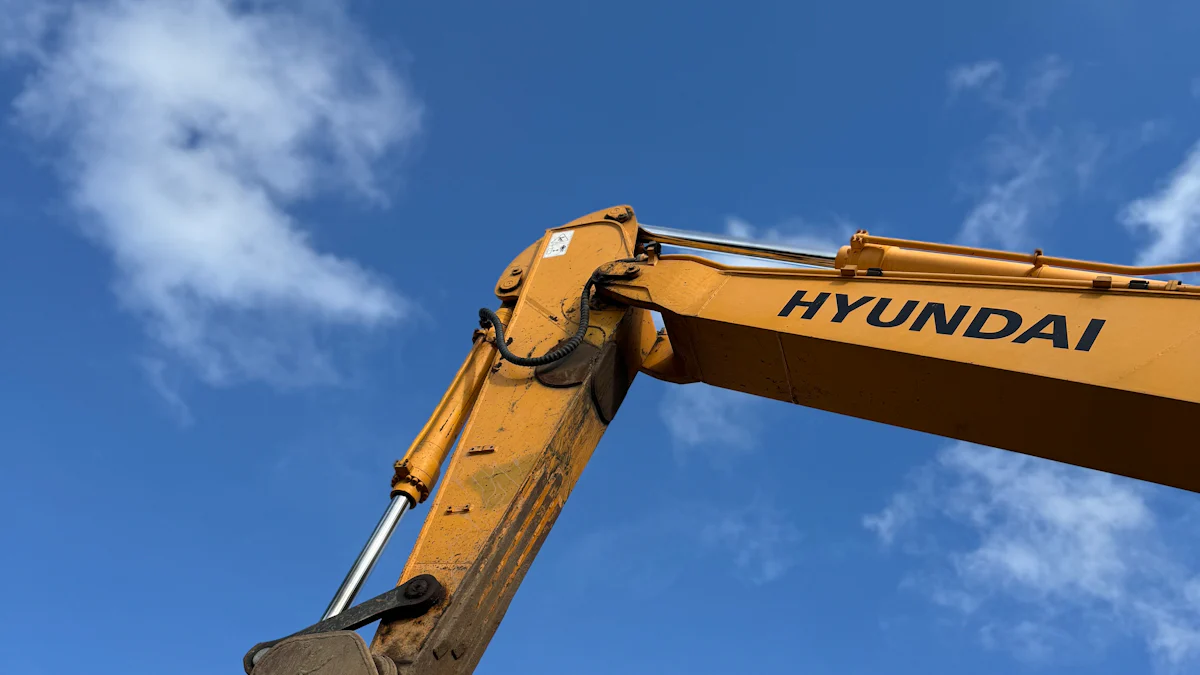
Choosing the right excavator parts bucket tooth is crucial for enhancing your work efficiency and reducing costs. Quality bucket teeth facilitate easier digging and have a longer lifespan. They are effective in various soil types as well. YNF Machinery offers high-quality excavator parts, including bucket teeth, ensuring you receive the best components for your projects. Selecting the appropriate bucket tooth not only improves performance but also saves you money in the long run.
Types of Excavator Bucket Teeth
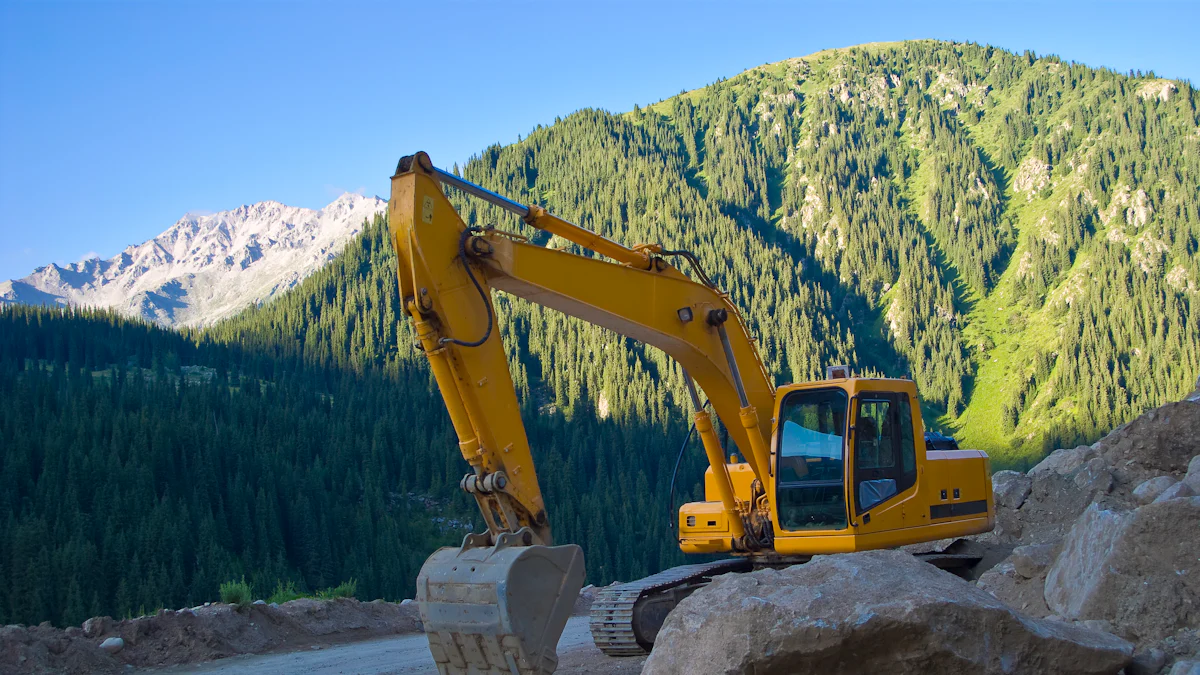
Picking the right excavator bucket teeth is key. It helps you work better and spend less money. There are different kinds for different jobs and places. Knowing these helps you pick the best one.
Standard Teeth
What They Are and When to Use Them
Standard teeth can do many things. They are good for most digging jobs and work in all types of dirt. These teeth go into the ground easily and aren’t too heavy, so they’re great when conditions change a lot.
Pros and Cons
Standard teeth have many good points. They last long and handle rough use well. But, they might not be best for special jobs. If your job stays the same, think about using more specialized bucket teeth for better results.
Rock Chisel Teeth
What They Are Made For
Rock chisel teeth are made for tough spots. They’re great in rocky areas and perfect for digging hard stuff like iron ore or rock. Their special shape helps them break through hard surfaces fast.
Good Things in Rocky Areas
In rocky places, rock chisel teeth are very helpful. They protect your machine from damage and make digging easier. Picking the right ones means less downtime and longer-lasting bucket teeth.
Tiger Teeth
What Makes Them Special
Tiger teeth are sharp with a pointy tip, making them perfect for tough soils. They’re longer and thinner, so they dig into hard ground well. These are great for projects with packed dirt or clay.
How They Work in Hard Soils
In packed soils, tiger teeth work really well. They dig into hard surfaces easily, so your machine doesn’t have to work as hard. Using tiger teeth makes your excavators more efficient even when it’s tough going.
Flare Teeth
What They Are and When to Use Them
Flare teeth are special excavator bucket teeth for certain jobs. They have a wide shape, great for moving loose stuff like sand and gravel. This shape helps carry more with each scoop, making work faster when you need to move lots of material. Flare teeth are handy when you need to clear big areas quickly or work with soft, loose things.
Why They’re Good for Moving Stuff
Flare teeth help move lots of material easily. Their wide shape means fewer scoops needed, saving time and wear on your machine. This saves money on fuel and repairs too. Plus, flare teeth spread the load evenly, keeping the bucket safe and lasting longer.
Heavy-Duty Teeth
What They Are Made For
Heavy-duty teeth are tough for hard digging jobs. These bucket teeth have extra strong parts to handle rough places like rocky ground or gravel roads. Pick heavy-duty teeth when your job needs strong tools that last.
Good Points and Limits
Heavy-duty teeth last long in tough spots, so you change them less often. But they can be heavy, which might not suit all excavators. They work best in hard places but might not be needed for easy tasks where other bucket teeth work fine.
Twin Tiger Teeth
What Makes Them Special
Twin tiger teeth have two sharp points for breaking hard ground. They’re great for digging into tough dirt like clay or packed earth.
How They Help in Hard Ground
The two points make it easier to dig into hard ground with less effort. This design helps your machine do better work without straining it too much. Picking twin tiger teeth means smoother digging and less wear on your equipment.
Chisel Teeth
What They Are and How to Use Them
Chisel teeth are special excavator bucket teeth for certain jobs. They have a flat, chisel shape that cuts through soft stuff like sand or soil. These teeth work well in places with loose gravel too. Their shape helps them dig and scoop easily, making them great for landscaping or small building projects.
Using chisel teeth lets you cut materials neatly. This is helpful when you need to dig carefully without messing up the area around it. You can use them for many things, like digging trenches or leveling ground.
Why They’re Good in Sand and Soil
In sandy or soil areas, chisel teeth have many benefits. Their flat shape makes digging smoother and easier. This means your machine doesn’t work as hard, helping it last longer. Less wear on parts saves money on repairs and keeps your excavator running well.
Chisel teeth are tough against wearing out, which is important in rough spots. They last long so you don’t have to change them often, saving time and money. Plus, they spread weight evenly in the bucket, keeping things steady.
When working with soft dirt or sand, picking the right bucket teeth matters a lot. Chisel teeth make digging better and help your project succeed by keeping your machine working its best.
Things to Think About When Picking Excavator Parts Bucket Tooth
When choosing the right excavator parts bucket tooth, think about a few things. These help your machine work better and last longer. They also make sure you pick the best bucket teeth for your job.
Soil Conditions
How Soil Type Affects Tooth Choice
The soil type affects which excavator bucket teeth you need. Different soils need different teeth for good digging. For rocky ground, use rock chisel teeth because they cut through hard surfaces well. Softer soils are easier with flare teeth, which fill the bucket nicely.
Matching Teeth to Soil Examples
Rocky Ground: Pick rock chisel teeth for strength and cutting power.
Soft Dirt: Use flare teeth to handle more material.
Hard Earth: Choose tiger teeth for their sharpness that breaks tough ground.
Project Needs
Why Project Needs Matter
Each project has special needs that decide which bucket teeth to use. Knowing these helps you pick ones that boost work speed and efficiency. For example, landscaping might need chisel teeth for neat cuts and control.
Real-Life Examples
In rocky places, a building site used heavy-duty excavator teeth, leading to less downtime and more work done.
A garden project used chisel teeth for tidy digging, keeping nearby areas neat.
Machine Fit
Making Sure Teeth Work with Your Machine
Your chosen bucket teeth must fit your machine well. This stops problems and makes both last longer.
Tips to Check Fit
Measure where they attach: Make sure the teeth fit the bucket’s spots.
Follow maker’s advice: Use what the maker says fits best.
Try them out: Test the fit before using them fully.
By thinking about these points, you can choose the best excavator bucket teeth, making your projects run smoothly and keeping equipment in good shape.
Taking Care of Excavator Bucket Teeth
Looking after your bucket teeth helps them work well and last longer. Checking them often lets you know when to change them, stopping problems before they start.
When Teeth Show Wear
How to Know They Need Changing
Check your excavator bucket teeth for wear signs often. Look for these clues:
Rounded or Blunt Edges: If the teeth aren’t sharp, digging gets harder.
Cracks or Chips: Fix these quickly to stop more damage.
Uneven Wear: This might mean they’re not lined up right and need fixing soon.
What Happens if You Ignore Wear
Ignoring worn-out bucket teeth can cause trouble:
Less Efficiency: Worn teeth make digging tough, using more fuel and time.
More Machine Strain: Dull teeth make the excavator work harder, risking breakdowns.
Higher Costs: More fixes and slow work mean spending more money.
Tips for Keeping Teeth in Good Shape
Regular Checks and Care Advice
To keep your bucket teeth working well, try these tips:
Regular Inspections: Look at your teeth before and after use to spot issues early.
Cleaning: Clean off dirt so they don’t rust or wear out fast.
Proper Storage: Keep equipment dry to avoid rust and other damage.
Making Bucket Teeth Last Longer
Make your bucket teeth last by doing these things:
Use Right Teeth for Jobs: Pick the right type, like chisel teeth, for each task to avoid extra wear.
Avoid Overloading: Don’t carry too much weight; it wears out the teeth faster.
Rotate Teeth: Switch their positions if you can, so they wear evenly.
By taking care of your excavator bucket teeth, you keep them working well and lasting longer. Regular care saves money and makes machines run better.
Thinking About Costs for Bucket Teeth Types
When picking bucket teeth, think about cost and quality. Smart choices can save you money over time.
Balancing Cost and Quality
Checking Cost-Effectiveness
Look at how cost-effective different teeth are. Cheap teeth might seem good but wear out fast. This means buying new ones often. Good quality teeth last longer and work better, saving money in the long run.
Saving Money with Quality Teeth
Good bucket teeth save money over time. They last longer, so you don’t replace them often. This means less downtime for your machine, helping finish jobs faster. Spending on strong teeth saves on repairs later.
Planning for New Teeth
Budgeting for Regular Changes
Plan to change worn-out teeth regularly to keep working well. Set aside money for new teeth when needed. Check them often to know when to replace them, avoiding sudden problems.
Ways to Save Money
Try these tips to save on bucket teeth costs:
Buy in Bulk: Buying many at once can be cheaper.
Keep Them Clean: Regular care makes them last longer.
Switch Positions: Rotate them to wear evenly.
These ideas help manage costs while keeping your machine working well.
Environmental Impact of Bucket Teeth
Sustainable Choices
Eco-friendly Materials and Designs
When picking excavator bucket teeth, think about green materials. Some are made from recycled stuff. These choices help the planet. By using them, you make Earth healthier. Look for designs that use less energy to make. These designs often last longer, so you change them less.
Reducing Environmental Footprint
You can lower your eco-footprint by choosing smart teeth. Pick ones that need less energy to make and move. This cuts down on carbon gases from making and shipping them. Strong teeth mean fewer changes, which makes less trash. Taking care of your tools helps teeth last longer, cutting down harm to nature.
Disposal and Recycling
Proper Disposal Methods
Throwing away old teeth right is important. Bad disposal hurts the earth. Follow local rules for getting rid of metal parts. Many places have recycling programs for metals. Joining these stops old teeth from filling dumps and causing long-term harm.
Recycling Options for Used Teeth
Recycling old excavator bucket teeth helps manage waste well. Many makers offer recycling services, turning old teeth into new things. Recycling saves natural resources and cuts raw material needs. If unsure about recycling, ask experts at your dealer for advice on best practices.
Expert Testimony: Parts and Service Experts stress asking pros when dealing with used bucket teeth: “If unsure about the best options for your equipment, seek advice from experts at your OEM dealer.”
By making smart choices about materials, disposal, and recycling, you help protect nature while keeping work smooth.
Expert Advice on Excavator Bucket Teeth
Industry Tips
Professional Suggestions
Picking the right bucket teeth is very important. Experts say match the tooth shape with your machine and digging needs. This helps work better and saves money. Here are some tips from experts:
Regular Checks: Look at your bucket teeth often for wear signs. This helps find problems early and keeps things running smoothly.
Right Use: Use the correct bucket teeth for each job. This makes them last longer and work better.
Choose Good Materials: Pick strong materials that last longer and resist wear.
Mistakes to Avoid
Avoiding mistakes can save time and money. Here are things to avoid:
Ignoring Wear Signs: Not fixing worn teeth makes digging hard and uses more fuel.
Wrong Teeth Type: Using wrong teeth for soil can cause damage fast.
Skipping Maintenance: Not taking care of teeth shortens their life.
Real-Life Stories
Successful Projects Examples
Learning from good projects gives helpful ideas. Here are some examples:
Rocky Building Site: A project used rock chisel teeth in tough places, cutting downtime and boosting work speed.
Garden Work: Using chisel teeth helped make neat cuts, keeping areas clean and improving quality.
Lessons from Experts
Experts share useful lessons from their work:
Be Flexible: Change bucket teeth as ground changes to work best.
Ask for Help: Talk to makers or sellers for advice on best choices.
Check Everything Well: Think about material type, tooth setup, and fit when picking bucket teeth.
By following these expert tips, you can make your excavator bucket teeth last longer and do better work, leading to successful projects.
Future Trends in Excavator Bucket Teeth
New Technology
Changes in Design and Materials
Technology for excavator bucket teeth keeps getting better. Makers use strong steel with special metals to stop wearing out and rusting. This helps your tools work well and last longer. Forged teeth made from treated metal are very strong and tough. These new ideas mean your bucket teeth can handle hard jobs better than before.
Effect on Work Speed and Quality
New designs make work faster and easier. Stronger edges help dig and level dirt better. This means you finish jobs quicker with less effort. Tougher teeth need fewer changes, saving time and money. By using the newest bucket tooth tech, your excavator works smoothly.
Market Changes
New Choices and Needs
People want more eco-friendly bucket teeth now. Green materials are popular because they help the planet. Recycled stuff is used more, making them standard choices.
Future Ideas
Soon, people will want more flexible bucket teeth for different soils. As building gets harder, we need teeth that do many things well. New tooth shapes will help meet these needs. Knowing about these trends helps you pick the best tools for your work.
Expert Insight: Experts say match tooth shape with machine needs for best results.
Picking the right bucket tooth is key for your project. It helps you work better and spend less money. Think about soil type, what your project needs, and if it fits your machine. This makes sure everything works well and lasts long. Construction Professionals say knowing when to change teeth makes machines work best. Manufacturers or Suppliers suggest checking material type and setup for better work. For strong bucket teeth, make sure they fit your equipment’s needs. Check out YNF Machinery for good excavator parts. Their know-how helps you choose wisely for great results.
